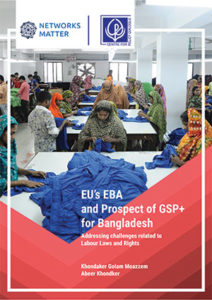 EU’s EBA & Prospect of GSP+ for Bangladesh
EU’s EBA & Prospect of GSP+ for Bangladesh
Addressing challenges related to Labour Laws and Rights
Over the past few years, Bangladesh has surpassed several milestones in terms of economic development: Bangladesh entered into the SDG era in 2015 after successful accomplishment of the MDGs, graduated from the ‘lower income country’ to the ‘lower middle-income country’ category of the World Bank in 2016 and fulfilled in 2018 all the three criteria to be eligible for graduation from the LDC group by 2024.
It is widely acknowledged that Bangladesh is capable of capitalising on the opportunities made available by its newfound achievements; however, there are many new challenges too. Bangladesh can now avail of due to its newfound achievements; however, there are a lot of new challenges as well. Bangladesh must overcome numerous legislative, structural and administrative challenges relating to labour standards, especially when it comes to the smooth graduation from the LDC category. The main challenges stem from the fact that Bangladesh will lose preferential market access to a lot of export destinations. It is estimated that Bangladesh will lose about 8 per cent of its total export earnings because of additional tariffs on its exports by 6.7 per cent due to preference erosion, which may lead to a loss of around USD 2.7 billion (Rahman and Bari, 2018). Since there will be a ‘grace period’ of another three years after 2024 when Bangladesh can still benefit from the preferential treatment facility for LDCs in the European Union countries, Bangladesh has around seven years left to prepare for the upcoming challenges.
The European Union is one of the major export destinations for Bangladesh, and one way to ensure that the exports from Bangladesh to the EU do not suffer a major setback in the post-graduation period is by becoming eligible for the Generalised Scheme of Preferences (GSP+ Scheme). However, gaining market access through the GSP+ scheme requires Bangladesh to comply with twenty-seven international Conventions, fifteen of which are related to human rights and the labour standards of ILO. This study reviews the shortcomings in the legislation, in the monitoring and application of the relevant standards in Bangladesh, and it puts forward suggestions for fulfilling all the requirements of GSP+ related to labour standards in a time-bound manner.
Authors: Khondaker Golam Moazzem and Abeer Khandker
Publication period: July 2021

